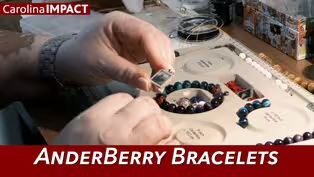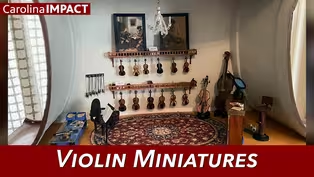
Moonshine & Whiskey
Clip: Season 11 Episode 1119 | 5m 29sVideo has Closed Captions
The craft of making moonshine and whiskey is alive in Wilkes County.
Once known as the moonshine capital of the world, the craft of making moonshine and whiskey is alive in Wilkes County. Meet the Call Family making and selling their family's version of these distilled spirits. Moonshine & Whiskey | Carolina Impact
Problems playing video? | Closed Captioning Feedback
Problems playing video? | Closed Captioning Feedback
Carolina Impact is a local public television program presented by PBS Charlotte

Moonshine & Whiskey
Clip: Season 11 Episode 1119 | 5m 29sVideo has Closed Captions
Once known as the moonshine capital of the world, the craft of making moonshine and whiskey is alive in Wilkes County. Meet the Call Family making and selling their family's version of these distilled spirits. Moonshine & Whiskey | Carolina Impact
Problems playing video? | Closed Captioning Feedback
How to Watch Carolina Impact
Carolina Impact is available to stream on pbs.org and the free PBS App, available on iPhone, Apple TV, Android TV, Android smartphones, Amazon Fire TV, Amazon Fire Tablet, Roku, Samsung Smart TV, and Vizio.

Introducing PBS Charlotte Passport
Now you can stream more of your favorite PBS shows including Masterpiece, NOVA, Nature, Great British Baking Show and many more — online and in the PBS Video app.Providing Support for PBS.org
Learn Moreabout PBS online sponsorship(upbeat music) - [Jason] Downtown Wilkesboro, tucked away in the foothills of the Blue Ridge Mountains.
The town draws you in with its historic charm, murals and classic Main Street buildings.
But at one time, Wilkesboro, and all of Wilkes County for that matter, were known for something else.
- [Brian] This is the moonshine capital of the world in a certain time period.
- Just a few miles from downtown.
- Over here in the stainless barrel, you see the mash fermentation.
- [Jason] What Brian Call and his son Austin are doing today is perfectly legal.
- This process, it starts out real sweet, when we cook the cornmeal and grain in and towards the end of fermentation, it ends up kind of a sour taste to it.
All that activities, when you pitch the yeast, that's the yeast eating up the sugar molecules and converting it into alcohol.
- [Jason] They're following an age old family recipe.
- I always ask Dad, why we do sour mash whiskey?
And he said, well, that's the way we've been doing it for generations, and three to four days fermenting in your fermentation tanks.
Then you'll pump it over into still.
Around 172 degrees, your alcohol vapor starts coming off.
- [Jason] Once condensed, then depending on the mash recipe, the flowing crystal clear alcohol ends up as moonshine or whiskey.
- Every still is different, but our still in about two hours, we can make around 180 gallons of whiskey or moonshine.
You can put fruit in it like this, make apple pie or sell it clear - [Jason] Everything at the distillery centers around family.
- My son will be eight generations.
Kind of started with a Lutheran minister over in Tennessee and he ended up having a legal distillery.
It is called the Daniel and Call Distillery, District four, number seven.
He is a Luther Minister and the temperance movement come through and there's a lady, Angelica, the story goes, preaching at his church.
And she looked right at him, said, you're gonna go to hell if you keep making this whiskey.
So he ended up selling out to Jack Daniels and choosing the Lord's work and some of the family members kept on in the whiskey business on the illegal side.
Here we are today in full circle, making legal moonshine and whiskey again.
- [Jason] During the era of prohibition, a few members of the Call family found themselves on the other side of the law.
- Grandpa, he was in the liquor business in a big way.
Him and Junior Johnson, they made shine together and grandpa ended up going to prison - With his grandfather away in prison, Brian's father, Clay, stepped up at a young age to help provide for the family.
- [Jason] His Uncle Howard was hauling whiskey and he started riding with him, helping him unload the product at around 13-year-old.
And the story goes, my dad, he started hauling around 14 and 15-year-old.
(gentle music) - [Jason] Now for the more romanticized part of illegal moonshine, the cars, built for speed, like this black '66 Dodge Coronet.
Brian's late father once used it for transporting his valuable but illegal cargo.
But Brian says his father's favorite car.
- So the '61 New Yorker was his favorite car.
It's a baby blue, looks more like a business coupe.
But my dad, he'd put a sports coat on and a Stetson hat and they thought he was somebody of importance like a judge or lawyer, but he'd have a trunk load of hooch in the back.
- [Announcer] With so many souped up cars running around, it was inevitable, bravado would kick in.
- When they weren't racing the police, a lot of times like you know how men are, they want to prove that theirs is the fastest or whatever.
So they would race each other and then that slowly got more organized until they founded NASCAR.
- [Jason] Clay Call was a lifelong friend of racing legend, Junior Johnson.
- Him and Junior Johnson had become best friends of hauling shine.
And I always asked dad, I said, why in the hell didn't you ever get into racing?
He said there wasn't no money in it.
He stuck to the moonshine business and Junior went on racing.
(gentle music) - [Jason] With the popularity of craft moonshine and whiskey on the rise, making sure the Call Family Distillery is ready to meet the demand means a lot of work.
But Austin Call sees it as an opportunity.
- There's more to it that meets the eye, learning the distribution part of it and pushing liquor, learning the alcohol industry in itself, it's a lot to take in.
- [Jason] For the family, the pride in what they've built is as clear as their moonshine.
- I'm just proud to be a part of this and a part of this family and the history that we have when it comes to making moonshine and whiskey.
- [Jason] I just want to get it built up enough where Austin can take over and keep the tradition rolling.
My grandpa and dad and everybody involved in the business is just thankful that I can carry on the tradition the legal way and don't have to be looking over my shoulder and worried about going to prison.
- [Jason] All around the world, you'll find distilled spirits, everything from Irish whiskey to Kentucky bourbon, Mexican tequila, or even Wilkes County moonshine.
Each unique in flavor and cultural identity, an identity the Call family is proud to be a part of.
For "Carolina Impact," I'm Jason Terzis reporting.
Video has Closed Captions
Clip: S11 Ep1119 | 4m 41s | Find out how a Charlotte teen used bracelets to financially help his family. (4m 41s)
Recycled Waste Water into Beer
Video has Closed Captions
Clip: S11 Ep1119 | 5m 52s | Charlotte Water and Town Brewing are producing beer made with recycled waste water. (5m 52s)
Video has Closed Captions
Clip: S11 Ep1119 | 5m 21s | Meet Charlotte miniature artist Amy Wright who recreates our world on a smaller scale. (5m 21s)
Carolina Impact: April 2nd Preview
Preview: S11 Ep1119 | 30s | Recycled Water into Beer, Moonshine & Whiskey, AnderBerry Bracelets, & Violin Miniatures. (30s)
Providing Support for PBS.org
Learn Moreabout PBS online sponsorship
- News and Public Affairs

Top journalists deliver compelling original analysis of the hour's headlines.

- News and Public Affairs

FRONTLINE is investigative journalism that questions, explains and changes our world.












Support for PBS provided by:
Carolina Impact is a local public television program presented by PBS Charlotte



